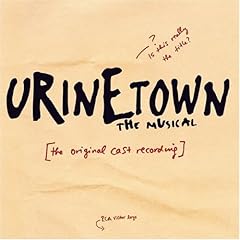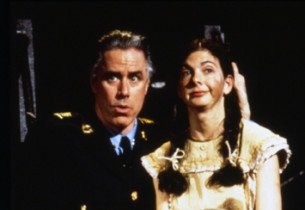

What's not to like about an entertaining, irreverent musical, performed by a superb singing and dancing ensemble with wonderful comedic gifts, that pokes fun at some of political theater's most enduring and boring pretensions?
Quite a lot, actually.
Urinetown: the Musical celebrates its self-conscious goofiness, its postmodern running commentary on itself and its appalling shallowness, to the point where its own conceits crush the wit of the show as surely, and surprisingly, as jets crushed seven buildings the week before its opening, a few miles south of its new Broadway home. There is much to like in Urinetown, but after the hyperventilating gush of a rave it received in the New York Times two days before I saw it, a corrective is needed. The show, briefly put, is about a society in which water is so severely regulated that a vilely corrupt corporation, UGC (Urine Good Company), has bought all the politicians so that they can charge a steep and ever-rising fee for every time someone pees. Yes, John Cullum is wonderful, helping legitimize the foul-smelling subject matter. Yes, the city may welcome a new show that is unremittingly silly, with a huge shrug as its prevailing attitude. But Urinetown is, in its own way, the very sort of political theater it pretends to mock, and its message is the opposite of the Brechtian dirges it sends up: Ruthless corruption and corporate malfeasance are better, in the end, than the rule of the (extremely dirty) people, and a fairly rational way to allocate scarce resources. This nonsense is satire the right-wing of the GOP could stand and cheer for, a sneer at the very notion that oppression should be opposed, or even resented.
Now, it is tempting to believe that there is only one thing to be concerned about these days, and that's to eliminate terrorism from our planet and be content with the good old USA just as it is. On the other hand, history tells us that a national emergency is an important occasion for very difficult soul-searching. If Urinetown were merely escapist fare, I would endorse it whole-heartedly as a blessed relief. The show, however, is a little more pernicious than that. Urinetown, you see, actually takes itself rather seriously, even as it mocks the genre it pretends to supplant. It identifies for its audience what is bullshit (theater that seeks to inspire political anger) and offers itself as an alternate paradigm (theater that mocks).
There is, of course, much to parody in most political theater: the stilted speeches of Mother Courage, Major Barbara, and their ilk; the blind ignorance of most everything produced by crusading, recently graduated theater majors; and the political naivete of works that suggest "Peace & Love" is a tangible political platform. Urinetown has fun with them, then, near the end of the show, literally shouts at its audience that populist rebellion makes things worse and that the ruthless oppression we've seen throughout the show is actually necessary to regulate our "unsustainable lifestyles." Huh?!? I seem to remember that General Motors bought up most of the nation's streetcar lines in order to shut them down and make us dependent on automobiles and foreign oil, that many of the most innovative energy saving inventions are patented processes owned and suppressed by various energy concerns, and that General Electric's old spokesman, Ronald Reagan, eliminated the solar-energy tax credit in pursuit of inefficiency that leaves us hostage to our -- you guessed it! -- unsustainable lifestyles. "The people" have been quite efficient, while government and business have regulated us into the mess we're in now. The same is true of much of the theater Urinetown mocks as well. Brecht, for example was trying to shake up a nation (Germany) somnambulent under Weimar and Nazi leadership. Well, I guess he was wrong too, for failing to get with the program! Greg Koltis, listed as the author of Urinetown's book, tells us in his Who's Who that he has a BA in Political Science from the University of Chicago, so it's not a stretch to analyze the views he's offering to several hundred people eight times a week. The book is undeniably clever, with many memorably axiomatic lines that become all the more disturbing in retrospect, as when John Cullum, as UGC's leader, lectures his rebellious daughter, "Did I send you to the most expensive university in the world to teach you how to revolt, or how to manipulate great masses of people?!" "To manipulate great masses of people, Daddy!" his daughter replies. Jennifer Laura Thompson, as the daughter, Hope, is wonderful in her role, as is her other romantic lead, Hunter Foster, as Bobby Strong, the leader of the rebellion. Their duets are exquisitely beautiful, and I look forward to hearing the future work of Mark Hollman, who wrote the songs. Jeff McCarthy, as the narrator, brings a perfect assuredness to a truly loopy role. I was reminded of Will Ferrell, but Mr. McCarthy has a level of charisma Ferrell can only make fun of. Mr. McCarthy may end up being one of the major stars to emerge from Urinetown. Jennifer Cody and Ken Jennings, too, bring well-honed comedy precision to their multiple roles, while Ms. Spencer Kayden pleased the crowd as the way-too-cloying Little Sally. John Carrafa's musical staging is the best thing I've seen on Broadway in years, with dances that appear effortless yet convey the mood of the piece (plus those being sent up) with great wit and savvy. Every dance number is just right, whether apparently chaotic or going for production-number wows, and all the more admirable for achieving that range without ever stretching the tone of the show itself. John Rando's direction looks equally effective.
In the end, Urinetown: The Musical's fatal flaw is its book. It pretends to make fun of the very notion of political theater while being an extremely political piece itself, and a numb-skulled example of the genre at that. Sorry to say, for all its many entertaining moments, Urinetown just ended up pissing me off.
